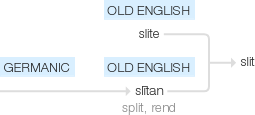Slit
late Old English slite (noun); related to Old English slītan ‘split, rend’ (of Germanic origin).
wiktionary
From Old English slītan, from Proto-Germanic *slītaną(“to tear apart”), from Proto-Indo-European *(s)leyd-(“to tear, rend (cut apart), split apart”). Possibly cognate with Latin laed-(“to strike, hurt, injure”).
etymonline
slit (v.)
c. 1200, from or related to Old English slitan "to slit, tear, split, rend to pieces; bite, sting; back-bite," from Proto-Germanic *slitan (source also of Old Saxon slitan, Old Frisian slita, Old Norse slita, Middle Low German and Middle Dutch sliten, Dutch slijten, Old High German slizan, German schleißen "to slit"). A more violent verb in Old English than after, as in slitcwealm "death by rending." Slit skirt is attested from 1913.A slitting-mill (1660s) cut iron plates into thin rods for making nails, etc.
slit (n.)
mid-13c., "long cut or rent (in clothes), incision," from slit (v.). Slang sense of "vulva" is attested from 1640s. Old English had slit (n.) with a sense of "a rending, bite; backbiting."
